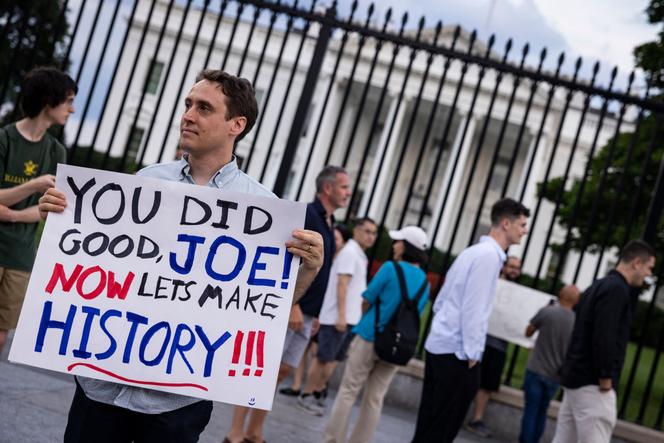


Several weeks of increasingly insistent pressure from his own friends, or those he thought to be, culminated on Sunday, July 21, in US President Joe Biden's letter to his countrymen: "While it has been my intention to seek reelection, I believe it is in the best interest of my party and the country for me to stand down and to focus solely on fulfilling my duties as President for the remainder of my term."
A historic decision. Biden is only the seventh president in almost 250 years to abandon his bid for re-election, more than 55 years after Lyndon Johnson, in 1968, at the height of the Vietnam War. Never before has the US seen such a turnaround so close to a nominating convention.
Anticipated, even desired, by many, Biden's withdrawal has nonetheless stunned the country, turning the campaign for the November 5 election on its head. Voters who kept telling pollsters how unhappy they were to see the 2020 rivalry between Biden, 81, and Donald Trump, 78, can rejoice. The Democratic Party has decided in favor of renewal. Having endorsed Biden in the absence of a real primary, and after months of anxiety about his health, the party eventually took just three weeks to orchestrate the withdrawal of the 46th president of the United States, with 107 days to go.
On Saturday, July 20, the incumbent president, confined to his home in Delaware after contracting Covid-19, had expressed in a press release his "eagerness" to resume the campaign he had had to suspend on July 17 in Las Vegas, Nevada. His campaign manager, Jen O'Malley Dillon, assured the press that Biden remained "absolutely" in the race for the White House, while admitting some "slippage" in the polls.
According to the media, the president took advantage of the time away to retreat around his family and come to terms with the decision that party leaders, some 30 members of parliament and former president Barack Obama were increasingly publicly encouraging him to take, at the risk of exposing the divisions that had emerged since the disastrous June 27 debate against Trump.
That evening, in front of 51 million viewers, Biden appeared paralyzed, searching for words but not always finding them, unable to counter the dozens of lies put forward by the Republican. The very next day began what ended up looking like a mutiny.
It took Biden four weeks of denial, of his physical and cognitive failings, and defiance, of donors and celebrities like George Clooney advising him to step down, to resolve to put an end to the increasingly divisive spectacle of Democrats arguing that he should stay in the race. The press had for weeks been stirring up past resentments, always from anonymous sources: Biden, it was said, was particularly hurt to be pushed out by Obama, who had already discouraged him from running in 2016, in favor of Hillary Clinton, an error of judgment according to him, confirmed in November by voters.
You have 63.75% of this article left to read. The rest is for subscribers only.
